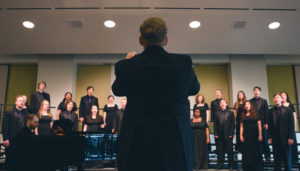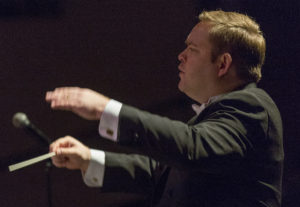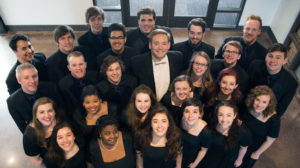Philosophy of Choral Music Performance in Higher Education
 As a whole, my professional objectives are simple: I aspire to invigorate the next generation of choral musicians and vocal music educators by creating profound musical experiences and serving as an educational role model through my work leading a collegiate choral program. A truly fine choral program requires three main facets for success – a program structure that rewards musical growth, course content that inspires and facilitates that growth, and musical opportunities that deeply impact the students and their audiences. My values, reflected in my teaching methods, center on musical excellence, effective musical education, and encouraging positive human interaction that inspires selfless artistic expression. As a professor, it is critical that I both provide a valuable choral singing experience grounded in these core facets to my singers and effectively model these ideals to future music educators.
As a whole, my professional objectives are simple: I aspire to invigorate the next generation of choral musicians and vocal music educators by creating profound musical experiences and serving as an educational role model through my work leading a collegiate choral program. A truly fine choral program requires three main facets for success – a program structure that rewards musical growth, course content that inspires and facilitates that growth, and musical opportunities that deeply impact the students and their audiences. My values, reflected in my teaching methods, center on musical excellence, effective musical education, and encouraging positive human interaction that inspires selfless artistic expression. As a professor, it is critical that I both provide a valuable choral singing experience grounded in these core facets to my singers and effectively model these ideals to future music educators.
The Power of Music

I am convinced that every human being possesses innate artistic qualities and a need to share these characteristics with others in a unique way. One such vehicle of expression is music. Music embodies that which makes us truly human – self-expression, emotional connection with others, and the creation of beauty. Our core as a civilization can be found in the soul and spirit-touching power of music and its ability to communicate and elicit emotional responses beyond what can be conveyed through merely spoken word. Consequently, I maintain there is no greater calling than one that allows me to instill such qualities in students, singers, and audience members through the performance process.
Collaboration
Coinciding with my belief in the power of music, I believe in using music to bring people together. The finest music is that which is made when working with others, and in my opinion, students singing together is musical collaboration in its purest form. The beauty of music comes from vulnerably expressing one’s self, and as a result, creating meaning in the sound. Singers need to live in an environment where they feel safe to express themselves – where an open collaboration is the norm and everyone understands that the singers, instrumentalists, and conductor are all creating art together. The music is larger than the individual and the artistic product is only as excellent and meaningful as what each individual is willing to contribute. This contribution is exactly that, a giving of oneself to the music. Establishing such a mentality in a group of individuals is, in effect, building self- and group-discipline. Constructing a group determination and a collective purpose (or mission statement) to continually pursue a higher level of artistry is key. Ideally, a byproduct of such an environment is that my students grow to appreciate the viewpoints and life experiences of fellow collaborators. Such a group purpose born out of a rehearsal/learning environment will not only affect the student singers of the ensemble but also the audiences that experience our music.
Principles of the Choral Curriculum
 I believe every musician must participate in certain essential musical experiences. Exposure should include singing a variety of repertoire from all eras and regions of the world. The music should reflect today’s culture, which has become a thorough mix of races, ethnicities, and religions and should include the rich traditions of western and non-western music. I believe in an all-inclusive approach to music education. Students should be provided with comprehensive training to develop both the technical skills to perform their music and the interpersonal principles of communication through self-expression and creative thinking. The level of music literacy of every student should be high enough for them to effectively contribute to a post-college music ensemble or any music-making event where music is printed. In addition to literacy, every music student should understand how to function within an ensemble and rehearsal. By both understanding and thriving in the rehearsal, each student will develop a lifelong appreciation for the effort that goes into quality performance. As a choral music educator, I believe that students should also understand the basics of good vocal technique. Each student should possess the content knowledge to further develop their own voice by singing with proper technique. My approach to teaching students this material is a very deliberate one.
I believe every musician must participate in certain essential musical experiences. Exposure should include singing a variety of repertoire from all eras and regions of the world. The music should reflect today’s culture, which has become a thorough mix of races, ethnicities, and religions and should include the rich traditions of western and non-western music. I believe in an all-inclusive approach to music education. Students should be provided with comprehensive training to develop both the technical skills to perform their music and the interpersonal principles of communication through self-expression and creative thinking. The level of music literacy of every student should be high enough for them to effectively contribute to a post-college music ensemble or any music-making event where music is printed. In addition to literacy, every music student should understand how to function within an ensemble and rehearsal. By both understanding and thriving in the rehearsal, each student will develop a lifelong appreciation for the effort that goes into quality performance. As a choral music educator, I believe that students should also understand the basics of good vocal technique. Each student should possess the content knowledge to further develop their own voice by singing with proper technique. My approach to teaching students this material is a very deliberate one.
(last updated 17 September 2016)
